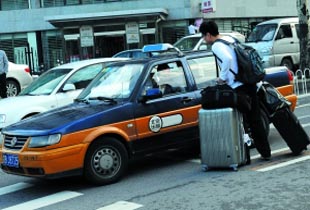 |
| The newly revised national standards for taxi operations and services strengthen to combat illegal actions of cabbies nationwide. (File Photo) |
The Standardization Administration of China has released new national standards for taxi services, which state that drivers cannot ask what passengers' destinations are before turning on the meter, in an effort to reduce the number of drivers rejecting passengers.
Experts said Sunday that the newly revised version of the 2008 national standards for taxi operations and services has been strengthened to combat illegal actions of cabbies nationwide.
Released on Thursday, the new standard states that cabbies should not reject passengers based on distance or destination. Cabbies are also prohibited from bargaining with passengers without running the meter, making unscheduled stops, taking detours to extend distances, or operating taxis without licenses.
This is a sound policy for customers, especially those in the smaller cities, Xu Kangming, an expert with a transportation consultancy, told the Global Times Sunday.
Liang Haichen, vice president of the Beijing Shouqi Group, shared Xu's view, saying that the national standard could improve the service quality of the taxi industry if it is implemented at a national level.
"It has significance as a guide for remote areas, which have lower taxi requirements," Liang added.
The rules are very strict and fewer illegal acts are occurring, a cabbie surnamed Liu from the Beijing-based United Crescent Automobile company, told the Global Times Sunday.
The new standard, to take effect on April 1, 2014, was published after a year's research, and included consultation with transportation experts, as well as managers and cabbies at taxi companies, said Liang.
Amid increasing concern about the illegal acts of drivers, other stakeholders are also taking actions at the local level, including in locations such as Beijing, Xi'an and Wuhan.
Beijing has had fewer complaints from customers about rejecting passengers after recent price hikes, which were proposed by the Beijing Municipal Commission of Development and Reform. Efforts to publicize a taxi complaint hotline have also had an effect, according to a statement from the Beijing Municipal Commission of Transport.
If taxi drivers in Beijing are found to have seriously violated the regulations, they face a ban on driving for up to three to five years, said Liang.
Details of enforcement of the new standards remain unclear. Cheng Shidong, a scholar at the Institute of Comprehensive Transportation with the National Development and Reform Commission, told the Global Times that it would be crucial. "We have many regulations and rules to combat the illegal acts of taxi drivers, but it's the efficient implementation of rules that will truly solve the problems," said Cheng, pointing out that illegal actions by cab drivers are often the result of unclear responsibilities among various parties such as cab companies and authorities.
According to statistics released by the Beijing Municipal Commission of Transport on Wednesday, there were 1,234 complaints in August, 50 fewer than in July, with seven drivers being added to a blacklist.
The commission received 1,284 complaints in July, among which 41.2 percent were about cabbies refusing to take the passengers, lower than the June figure.
The Xi'an Xianyang International Airport has also introduced a blacklist scheme, to be implemented on November 1, which bans misbehaving drivers from the airport premises.
 2013 Colour Me Rad 5K run held in Canada
2013 Colour Me Rad 5K run held in Canada China's destroyer Qingdao sails out of Sydney Harbor
China's destroyer Qingdao sails out of Sydney Harbor Chinese tycoon aims to restore London's Crystal Palace
Chinese tycoon aims to restore London's Crystal Palace Worst flooding hits Yuyao, 70% of downtown area underwater
Worst flooding hits Yuyao, 70% of downtown area underwater Game for the brave: 'Spiders' in Yandang Mountains
Game for the brave: 'Spiders' in Yandang Mountains Hungarian wingsuit flyer confirmed dead in Zhangjiajie
Hungarian wingsuit flyer confirmed dead in Zhangjiajie New couples take wedding photos during holiday
New couples take wedding photos during holiday Serena Williams stumbles through to quarterfinals
Serena Williams stumbles through to quarterfinals Thailand Mobile Expo 2013 kicks off
Thailand Mobile Expo 2013 kicks off Photo collection of Chinese Navy
Photo collection of Chinese Navy Photo story: Young tenants in Beijing
Photo story: Young tenants in Beijing Twins Culture Festival kicks off in Beijing
Twins Culture Festival kicks off in Beijing UNESCO world heritage site: Montale Tower
UNESCO world heritage site: Montale Tower Israeli drone crashes into Mediterranean, fragments recovered
Israeli drone crashes into Mediterranean, fragments recovered Serena Williams wins second China Open title
Serena Williams wins second China Open titleDay|Week|Month